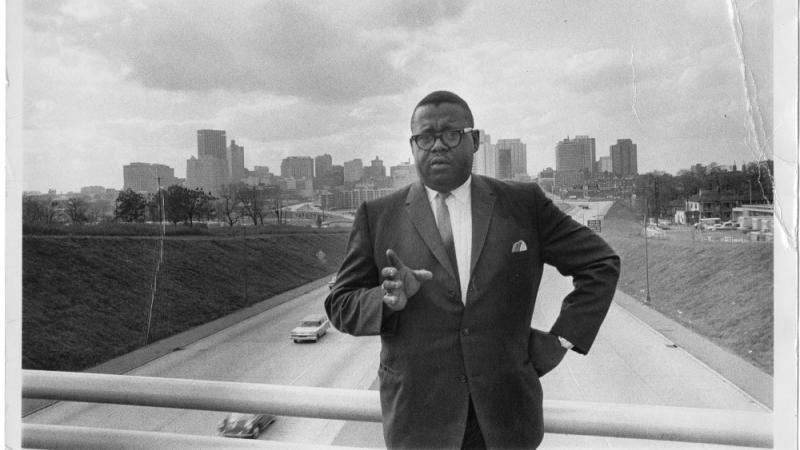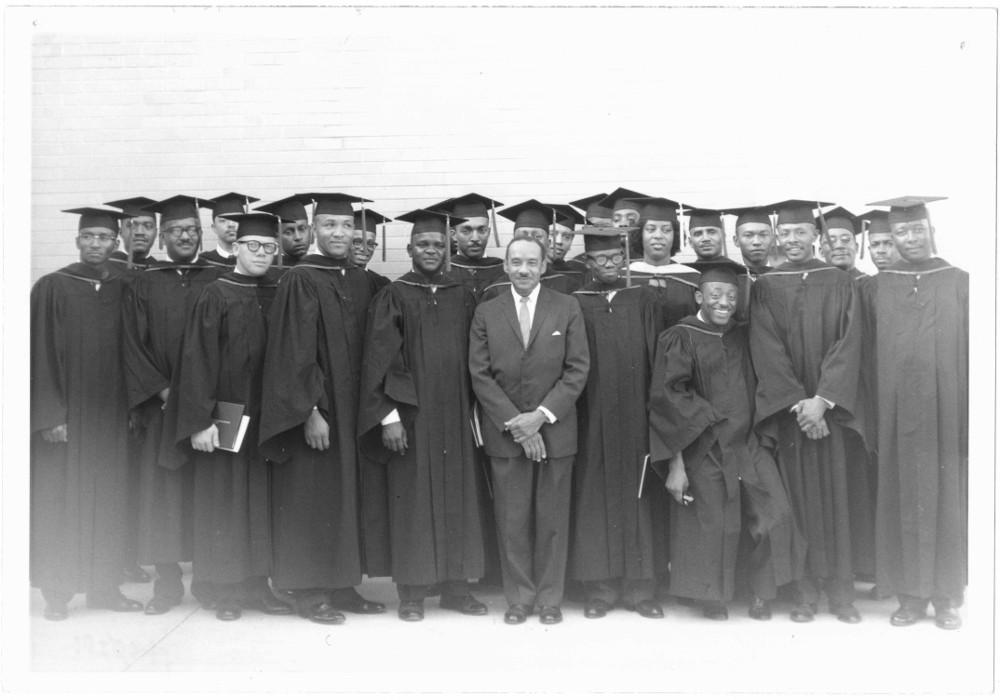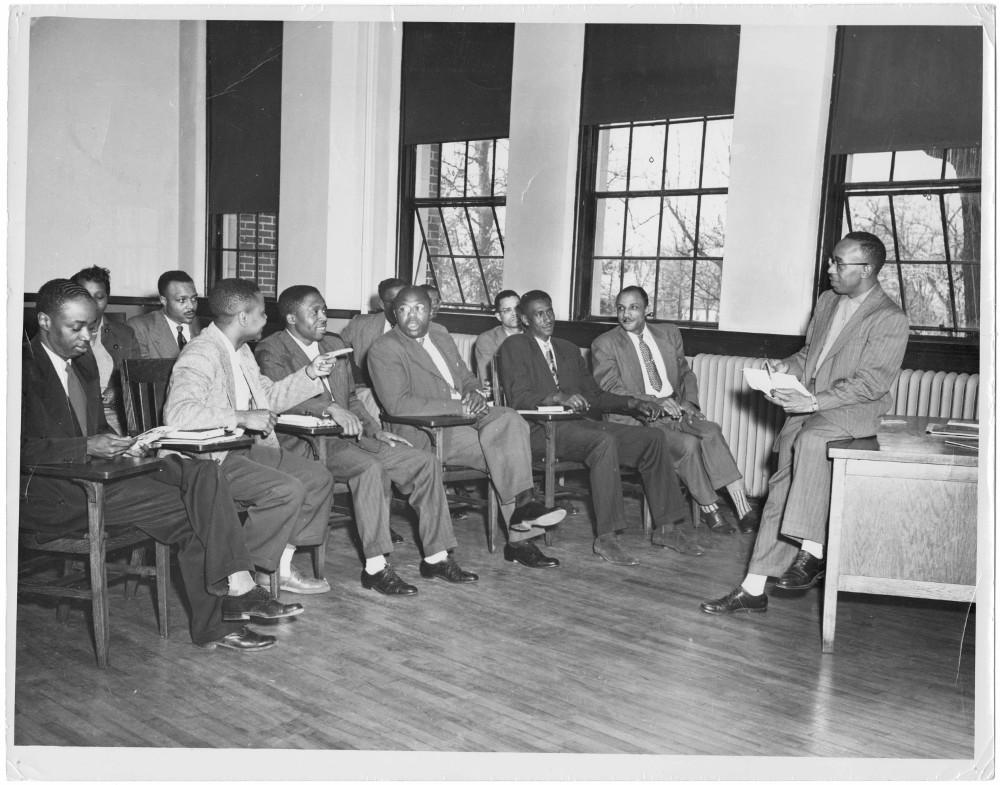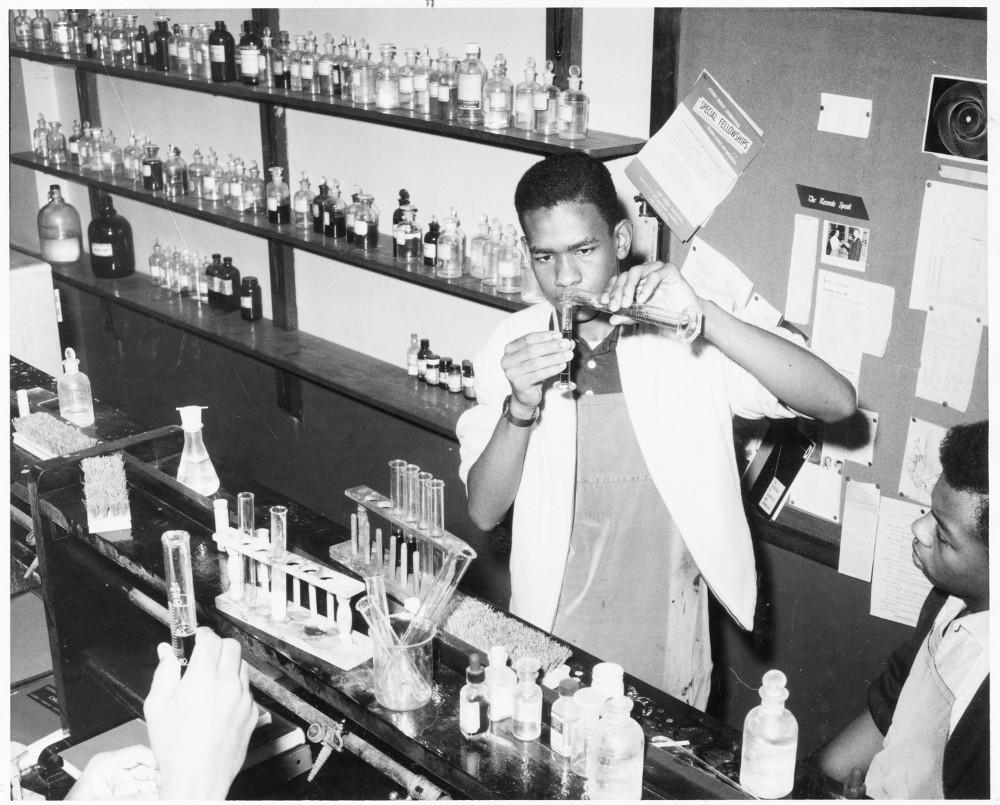Spreading the Word on the History of African American Religion
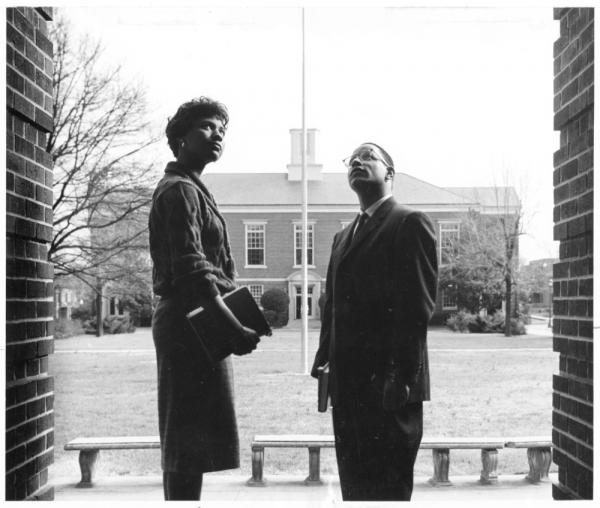
"Students in an Entryway" (circa 1960). James P. Brawley Collection. Image 133. http://digitalcommons.auctr.edu/braw/133
Image courtesy of The Atlanta University Center Robert W. Woodruff Library.

"Students in an Entryway" (circa 1960). James P. Brawley Collection. Image 133. http://digitalcommons.auctr.edu/braw/133
Image courtesy of The Atlanta University Center Robert W. Woodruff Library.
In 2015, NEH awarded a grant to the Atlanta University Center (AUC) Robert W. Woodruff Library to support the arrangement, description, and selected digitization of unique materials documenting the history of African American religion from the late 19th to early 21st centuries. The items being digitized include over 2,000 photographs and more than 1,100 audio and video recordings, including interviews with prominent figures in the religious community and civil rights movement. They are available through the project’s website. This grant was made through NEH’s Humanities Collections and Reference Resources program, which supports a variety of activities associated with preserving and creating access to valuable sources for research, education, and public programming and use.
Last summer, I had the privilege of visiting the AUC Woodruff Library in Atlanta and meeting members of the Library’s administration and staff of the Archives Research Center, including, Andrea Jackson, Christine Wiseman, and Jessica Leming, who are overseeing and carrying out this important project. For this feature article, we wanted to give them the opportunity to discuss the endeavor in their own words; we’re exceedingly grateful for the information they’ve provided. As Black History Month comes to a close, we’re pleased to present this profile highlighting the significance of religion in African American community life.
- Joel Wurl, Division of Preservation and Access
NEH: Among the many special collections that the AUC’s Archives Research Center holds, how did you arrive at the decision to concentrate on these sources?
AUC staff: The AUC Woodruff Library’s Archives Research Center has several collections related to African American religion that were processed but underutilized, or unprocessed and inaccessible to the public. Many of these collections include audio and visual recordings which needed attention, preservation due to inherent deterioration, and reformatting due to obsolescence of technology to enable research and scholarship. As we considered the breadth and depth of these holdings, we counted fourteen archival and manuscript collections with historical significance related to the study of religion, which needed processing to be made more broadly accessible. We believed these collections – collectively as the “Spreading the Word” project – would greatly contribute to emerging scholarship on African American religion, as well as strengthen research, teaching and learning of humanities materials ranging from the late 19th to the early 21st century. One of our member institutions – the Interdenominational Theological Center – is a graduate-level institution educating future ministers, seminarians, and religion scholars, and we recognized that these resources could be invaluable to their curriculum, as well as that of the other institutions. The collections were perfect for NEH funding as the AUC Woodruff Library is the owner of these donated collections, and there are no restrictions to the use and access of these materials. The collections also complement additional materials related to religion – and other humanities disciplines such as sociology, philosophy, and history – which are currently accessible for research in the Archives Research Center.
NEH: What are a few of the highlights in these collections that really stand out (including any unexpected discoveries or items that staff members personally have found to be extraordinary)?
AUC Staff: One of the collections included in the project is the Anna E. Hall Collection. Hall, a Clark University (now Clark Atlanta University) graduate, went on to become a Methodist missionary in Liberia from 1906 to 1930. An interesting find within her collection was a of President (and Founder) Harry V. Richardson relaying the history of the Interdenominational Theological Center and the fortuitous meeting he had with the Rockefeller Foundation Sealantic and General Education Funders, who were the initial benefactors of the school. As there are more collections being processed and uploaded, we look forward to even more intriguing discoveries!
NEH: Do you have a sense yet of the level of interest in the project among people who might use the collections? Any examples you could touch upon?
AUC Staff: To date we have posted 2,835 audio and visual items in our Digital Commons representing several collections from the Spreading the Word Project. We are already noticing that there is wide usage of these resources, as the digital images, audio and video recordings have received 3,377 metadata page hits and 4,536 downloads from academics, government officials, and private citizens from 89 countries worldwide. One example of use of the resources relates to an interview conducted by WNYC (NPR) radio with prominent religion scholar, Dr. C. Eric Lincoln, back in the 1980s, now featured online. The archivist from WNYC recently found a photograph from the C. Eric Lincoln Lecture Series Collection in his online search, and contacted us to request permission to add the image to their website to complement the online interview. Locally, the project is being promoted in archival instruction classes across disciplines at the Atlanta University Center institutions. We anticipate that students across our member institutions – and primarily within our religion and philosophy programs – will utilize these resources in their research, scholarship, and study.
NEH: In what ways, if any, has the project benefited from the involvement of others from beyond the research center, including community members?
AUC Staff: We have seen an increase in partnerships with one of our faculty members representing the Religion and Philosophy program at one of our member institutions. He has helped us to promote the project to scholars, students, and donors, and has assisted us in acquiring additional materials to add to some of the collections. Further, we have a collection of materials documenting the professional life of a long-time professor who taught at the Interdenominational Theological Center – Isaac Clark. One of his former students has provided us with information about Dr. Clark which was helpful in understanding some of the content received and in creation of metadata. We look forward to gaining more student and community involvement in identifying people, places, and events in our digital collections. All of the digital resources include a “contact us” note, which we hope patrons will use if they have further information to contribute.
NEH: How has the work you’re doing, in terms of methodology, compared with what you anticipated would happen when you submitted the grant application? Have there been any unanticipated positive outcomes for the ARC more generally? Any special challenges along the way?
AUC Staff: I would say that the scale of the project has provided us with the opportunity to test and refine workflows and procedures to create efficiencies and standard practices. We have learned to be flexible and willing to adjust priorities to balance phases of the project where you may be ahead of schedule with those you find need more time commitment. For example, it worked better for the vendor to send all of the content for digitization in one batch, which required some adjustments to the original work plan. Further, we have learned firsthand some challenges in providing access and long- term preservation to large digital files typical in audio- and video-rich collections. The project, overall, has enabled us to build upon existing policies and procedures between the Archives Research Center and the Digital Services Department, so that this project, as well as future projects will have a high level of consistency and quality in terms of conversion and description of digital objects.
NEH: For readers who aren’t familiar with the Atlanta University Center, can you say a bit about the institution’s history and mission? How do Woodruff Library and the ARC fit into this?
AUC Staff: The Atlanta University Center (AUC) is the world’s largest consortium of Historically Black Colleges and Universities; it includes Clark Atlanta University, the Interdenominational Theological Center, Morehouse College, and Spelman College. The Archives Research Center contains historical materials related to these institutions, Morris Brown College, as well as the historical AUC institutions of Atlanta University, Clark College, and Gammon Theological Seminary. The early histories of the schools date back to the end of the Civil War as Atlanta University was founded in 1865. Located in the historic West End district of Atlanta in very close proximity, each of the private institutions is independently operated with varying missions (some single gender, one offers only graduate degree programs); they share some resources, including a modern information center – the Atlanta University Center Robert W. Woodruff Library. Established in 1982, The AUC Woodruff Library supports the teaching, learning and research missions of the students, faculty and staff of the AUC. Central to the mission of the library is the cultural preservation of the AUC which is reflected in the collections and activities of the Archives Research Center. The Archives Research Center’s holdings are built upon the Negro Collection founded in 1925 at Atlanta University’s Trevor Arnett Library, and it is our vision to be a “premier destination archives” connecting local community and the world to the rich historical and cultural resources in the AUC.
NEH: Finally, I understand that Woodruff Library is home base for the HBCU Library Alliance. In what ways might a project like “Spreading the Word” align with that organization’s purpose and goals?
AUC Staff: Created in 2002, the HBCU Library Alliance is a consortium that supports the collaboration of information professionals providing an array of resources to Historically Black Colleges and Universities (HBCUs) and their constituents through various projects and leadership programs. Loretta Parham, CEO and Director of the AUC Woodruff Library, was one of the founding directors. The AUC Woodruff Library serves as the technical administrator of the HBCU Library Alliance Digital Collection, a collection that has grown to more than 16,000 images representing the founding materials of twenty-two HBCUs. Images of materials dating from the early 1800s to the present document the role of HBCUs in the history of African-American higher education. The Spreading the Word project complements the efforts of the HBCU Library Alliance to broaden the accessibility and preservation of the history and collections held by Historically Black Colleges and Universities.
NEH: Is there anything else you’d like to add?
AUC Staff: In collaboration with the AUC Woodruff Library’s Theological Librarian, Brad Ost, Christine Wiseman and Andrea Jackson co-authored an article featured in the April 2016 Theological Librarianship Journal, “Funding the Future of African American Religion Archival Collections at the Atlanta University Center’s Robert W. Woodruff Library.” The article details the pursuit of grant funds from NEH to prepare, process, and digitize the collections in the “Spreading the Word” project, as well as from other funding sources to preserve and make accessible archival materials on African American religion. We hope it can be helpful to others as they seek support for innovative and important archival projects.
We invite others to learn more about the “Spreading the Word” project and collections, as well as the history within these archival records by viewing and subscribing to our exciting blog!

